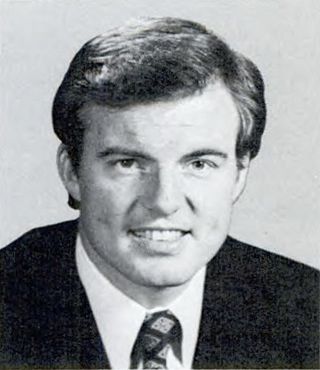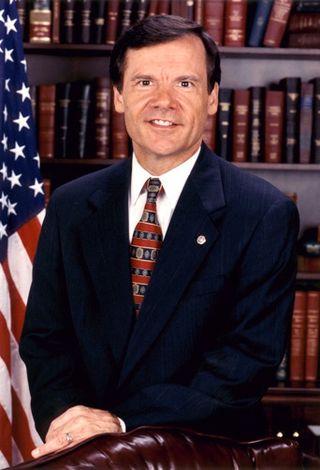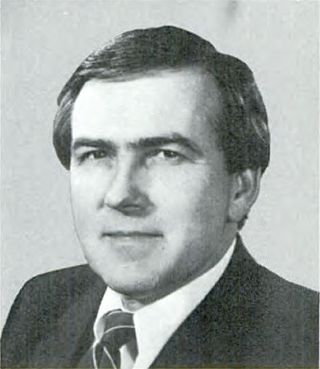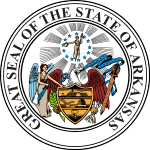
Orval Eugene Faubus was an American politician who served as the 36th Governor of Arkansas from 1955 to 1967, as a member of the Democratic Party. In 1957, he refused to comply with a decision of the U.S. Supreme Court in the 1954 case Brown v. Board of Education, and ordered the Arkansas National Guard to prevent black students from attending Little Rock Central High School. This event became known as the Little Rock Crisis. He was elected to six two-year terms as governor.

Frank Durward White was an American banker and politician who served as the 41st governor of Arkansas. He served a single two-year term from 1981 to 1983.

James Guy Tucker Jr. is an American former politician, businessman, and attorney who served as the 43rd governor of Arkansas from 1992 until his resignation in 1996 after his conviction for fraud during the Whitewater affair. A member of the Democratic Party, he previously served as the 15th lieutenant governor, state attorney general, and as a U.S. representative.

Dale Leon Bumpers was an American lawyer and politician who served as the 38th Governor of Arkansas (1971–1975) and in the United States Senate (1975–1999). He was a member of the Democratic Party. He was counsel at the Washington office of law firm Arent Fox LLP, where his clients included Riceland Foods and the University of Arkansas for Medical Sciences.

David Hampton Pryor was an American politician who served as a representative for Arkansas's 4th congressional district from 1966 until 1973 and as a senator from Arkansas from 1979 until 1997. A member of the Democratic Party, Pryor also served as the 39th Governor of Arkansas from 1975 to 1979 and was a member of the Arkansas House of Representatives from 1960 to 1966. He served as the acting chairman of the Arkansas Democratic Party from 2008 to 2009, following Bill Gwatney's assassination.
Southern Democrats are members of the U.S. Democratic Party who reside in the Southern United States.

Young Timothy Hutchinson is an American politician, lobbyist, and former United States senator from the state of Arkansas. A Republican, he was the first Republican U.S. senator to represent Arkansas since the reconstruction era.

Tommy Franklin Robinson was an American businessman, lobbyist, and politician who served as the U.S. representative for Arkansas's 2nd congressional district from 1985 to 1991. He was a member of the Republican Party. Before he was elected to Congress, Robinson was the sheriff of Pulaski County.

The Democratic Party of Arkansas is the affiliate of the Democratic Party in the state of Arkansas. The current party chair is Grant Tennille. Former U.S. president Bill Clinton was born in Arkansas, and served as state governor from 1979 to 1981 and 1983 to 1992.

The 1978 Arkansas gubernatorial election, held on November 7, was the first time that future president Bill Clinton was elected Governor of Arkansas.

The 1966 Arkansas gubernatorial election was held on November 8, 1966. Winthrop Rockefeller was elected governor of Arkansas, becoming the first Republican to be elected to the office since Reconstruction in 1872.
Bill Clinton served as the 42nd president of the United States (1993–2001) and as the 40th and 42nd governor of Arkansas. A member of the Democratic Party, Clinton first ran for a public office in 1974, competing in the congressional election for Arkansas's 3rd congressional district. After narrowly losing to incumbent representative John Paul Hammerschmidt, he ran for the office of Arkansas Attorney General in 1976. He won the Democratic primary comfortably, receiving over 55% of the popular vote. Witnessing his strong support during the primaries, Republicans did not nominate a candidate to run against him. Clinton won the general election unopposed. His experience as the attorney general was considered a natural "stepping-stone" to the governorship.

The 1982 Arkansas gubernatorial election was held on November 2, 1982. Former Democratic governor Bill Clinton regained the position after having narrowly been defeated by Republican candidate Frank D. White at the previous election. Clinton held the position from January 1983 until he resigned after being elected president in 1992. As of 2024, this is the last time that an incumbent governor of Arkansas lost re-election.

Edward Sheffield Nelson is an American attorney, businessman and politician from the capital city of Little Rock, Arkansas. Originally a Democrat, Nelson in 1990 ran for governor of Arkansas as a Republican against then governor and future U.S. president Bill Clinton and in 1994 against another Democrat, the incumbent governor Jim Guy Tucker.

Aylmer Lynn Lowe, known as A. Lynn Lowe, was an American businessman and politician from Garland near Texarkana in Miller County in southwestern Arkansas, who was a major figure in the Arkansas Republican Party. He was the Republican gubernatorial nominee in 1978 against the Democrat Bill Clinton, served as state party chairman from 1974 to 1980, and was the GOP candidate in Arkansas's 4th congressional district in 1966, having been defeated by the Democrat David Pryor, then a state representative and a future governor and U.S. Senator, originally from Camden in Ouachita County in south Arkansas.

The 1996 United States elections were held on November 5, 1996. Democratic President Bill Clinton won re-election, while the Republicans maintained their majorities in both houses of the United States Congress.

The 1992 United States elections elected state governors, the president of the United States, and members of the 103rd United States Congress. The election took place after the Soviet Union crumbled and the Cold War ended, as well as the redistricting that resulted from the 1990 census. Often considered "The Year Of The Woman," these elections brought an increased number of female politicians to Washington such as Dianne Feinstein (D-CA) and Carol Moseley Braun (D-IL). Governor Bill Clinton of Arkansas defeated incumbent president George H. W. Bush and businessman Ross Perot in the presidential election. The Democratic Party maintained their control of both chambers of Congress. This is the first Democratic trifecta since the Republican victory in the 1980 elections, the last one in the 20th century, and the last one overall until 2008.

The 1996 United States Senate election in Arkansas was held on November 5, 1996. Incumbent Democratic U.S. Senator David Pryor decided to retire. Republican Tim Hutchinson won the open seat, becoming the first Republican to win a U.S. Senate seat in Arkansas since Reconstruction in 1872 and the first to ever be popularly elected in the state. He was the first to win this seat since 1870. Hutchinson lost re-election in 2002 to David Pryor's son Mark Pryor.
Marshall Ney Chrisman Jr., is a businessman from Ozark in Franklin County in northwestern Arkansas, who served from 1969 to 1970 as a Republican member of the Arkansas House of Representatives. For a single term, he represented Franklin and neighboring Johnson counties. In 1980 and 1982, Chrisman fell far short in primary bids against Frank D. White for the Republican gubernatorial nomination.

Bill Clinton served two tenures as governor of Arkansas. Elected in 1978, Clinton first served as governor for a single term from 1979 until 1981, losing his bid for reelection in 1980. After a two-year interregnum, Clinton returned to the governorship after winning the 1982 election. Clinton would be elected to five further terms, serving until mid-December, 1992, when he resigned amid his transition into the U.S. presidency after having been elected president in the 1992 presidential election. Clinton was the second-longest serving governor in the state's history, after Orval Faubus.






















